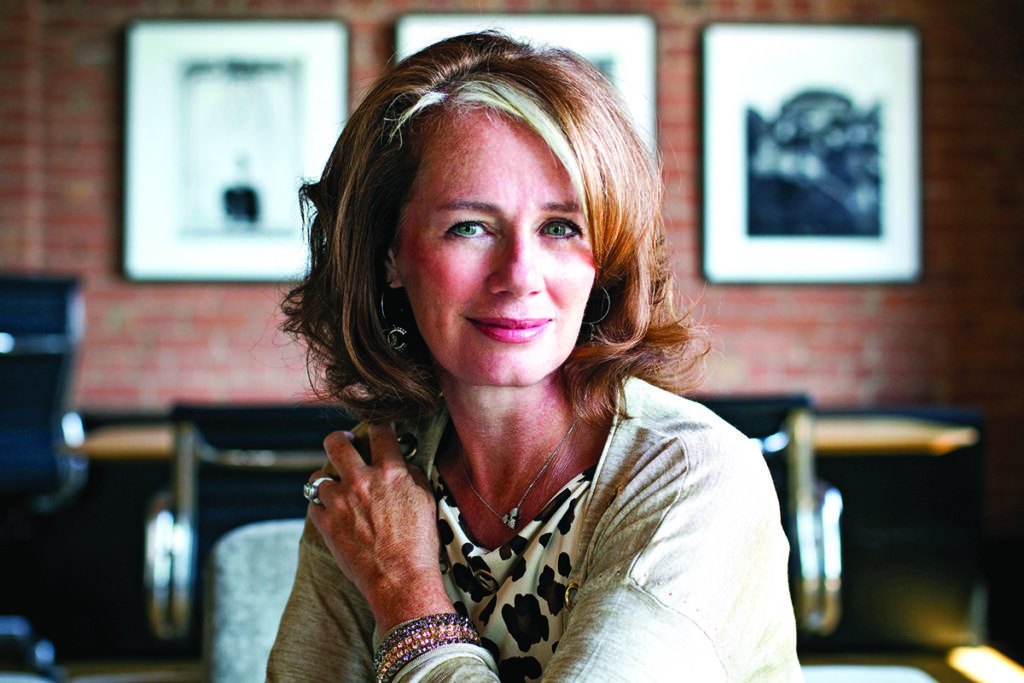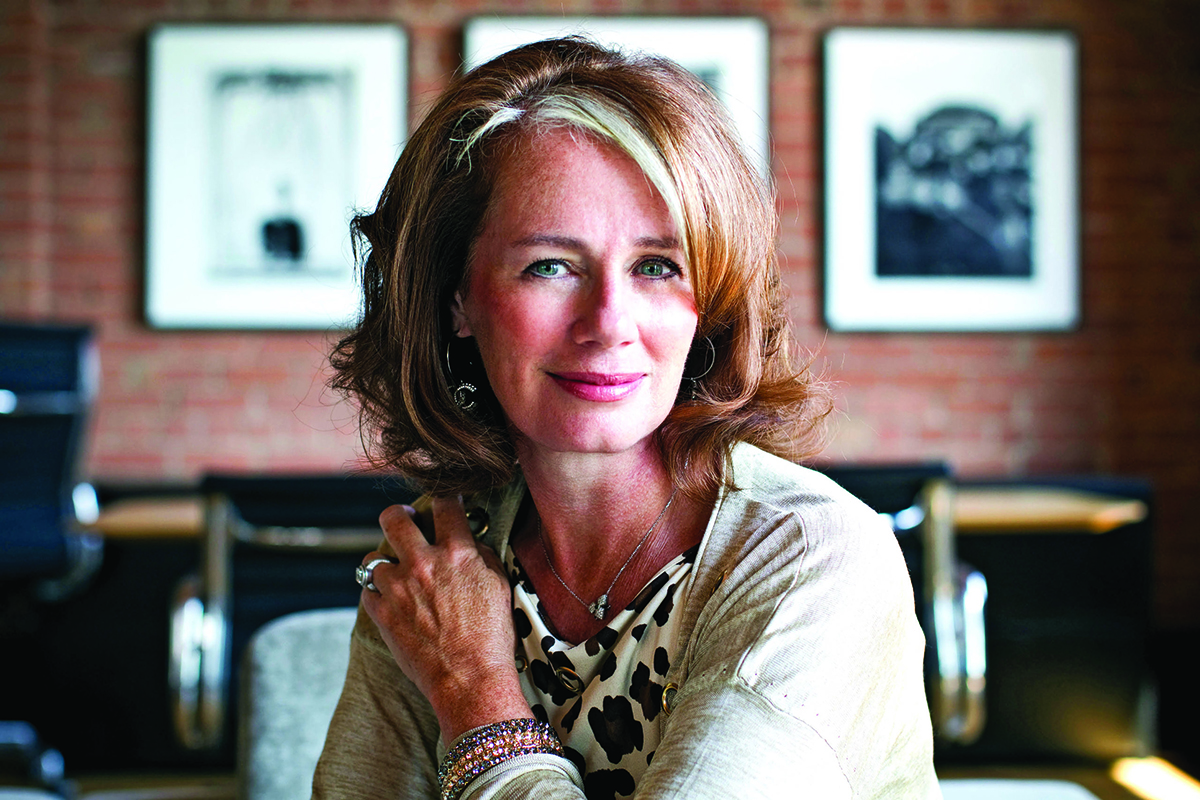
In conversation with Arlene Dickinson
By Jeremy Finkelstein
(Photo courtesy of CBC)
Arlene Dickinson is one of Canada’s most respected and visible business leaders. Though famous for her decade-long stint as one of the venture capitalists on the hit CBC reality show, Dragons’ Den, Arlene rose to prominence as CEO of Venture Communications Inc., one of Canada’s largest full-service marketing agencies. Hers is a true rags-to-riches story, and her path from single mother at risk of losing her children to becoming one of Canada’s most powerful business women is well-documented.
Today, Arlene is a celebrated TV personality, marketing leader, best-selling author of two books, venture capitalist, blogger, speaker, and—most importantly—mother. In an era where society still questions whether women can have fulfilling, successful careers and a functioning, healthy family life, Arlene serves as a sterling example that being a parent and being a business leader are not mutually exclusive. Today’s businesses would be well-served to take a page from Arlene’s book, however despite numerous reports that illustrate how women in the workforce boost economic activity and that gender diverse boardrooms improve financial results, Canada sits only 15th of 29 OECD countries in terms of pay gap between men and women, and only 14 per cent of all board seats on TSX-listed companies are held by women.
With this as the backdrop, Arlene Dickinson sat down with The Collection’s Jeremy Finkelstein for a one-on-one discussion on the evolution of the Dragons’ Den, the changing face of entrepreneurship in 2018, and the critical importance of balance in the boardroom and supporting women in the workforce.
The Collection: Dragons’ Den is in its 12th season. Why do you think the program has had such staying power?
Arlene Dickinson: I think everyone can relate to having a dream or an idea. It’s no different than people who sing on those [talent] shows. Business is kind of fundamental…we can all think of an idea we had that we’d wished we had done, or we all want to see what next idea is out there. So, I think people relate to it, people can see themselves in the Den pitching, and they’re curious about how business works.
TC: How has the program evolved since you first joined the cast?
AD: People are certainly more focused on who they want to partner with and already understand what they should be doing. So, I think the entrepreneurs have become more in tune with the show and are better prepared. Also, the businesses are larger, for the most part, so the stakes are higher. And, then the panel has changed, so a combination of all those things have kept it interesting.
TC: With the exception of Jennifer Wood in Season One, you were the lone female Dragon for the first 10 seasons. Why do you think the panel was so dominated by male investors over the first decade?
AD: What’s interesting is that the panel at the time was very representative of the percentage of women in senior positions in companies and on boards across the country. 17 to 20 percent is kind of that number, so if you think about it, that was representative. I think what CBC has done, by adding three women and three men to the panel, has started to represent what really needs to happen in business, and they’re showing the way…that you can have balance, that you can have diverse opinion, that you can have gender representation, and still have an incredibly smart, intelligent and engaging show.
TC: What have Manjit and Michele brought to the program?
AD: They certainly have brought a different perspective. Michele is younger, she has a different view, she comes from a tech background. Her view is different, generationally. And Manjit comes from a family business so she has a view of what it feels like to grow and build a family-based business. I think they’re bringing different perspectives that are very interesting.
TC: What’s been the biggest change to the business environment since you began your work with the Den?
AD: Technology really is underpinning a lot of the evolution of business and how we do things…between artificial intelligence and cryptocurrencies and the evolving ways in which we consume and buy products. All of those things have really changed the face of retail and how businesses are grown and built. I think the show is reflective of that…the type of businesses we see and the things people have to do to grow a business. But, saying all that, the fundamentals are still the same. You still have to know your consumer, you have to know the marketplace, you have to understand your channels, you have to understand what the trends are. It’s the same fundamentals, just applied differently.
TC: What does success look like in 2018?
AD: It’s different for everybody but if you’re a true entrepreneur, you’re probably never satisfied. There is no such thing as crossing a success finish line. You’re always looking to do more and build more and add more. But I think success is feeling like you are doing what you are passionate about, that your market is accepting you. But more importantly, that you’re feeling like you’re living your life fully.
TC: You advocate for a triple bottom line approach to business that considers profits, people, and the planet. Are we seeing more of this mentality taking hold in this economy?
AD: For sure…especially with the next generation of entrepreneurs. They’re always thinking about how that can be a fundamental element to their business, whereas older or more traditional businesses tend to think about it after the fact, and bolt it on because they didn’t start with that premise. New generation businesses are thinking about it right from the very beginning.
TC: You recently shared an anecdote on social media about a female entrepreneur who came to you looking for an investor. During your meeting, she hesitated before explaining that she was pregnant. Are we still, collectively, questioning whether a woman is able to raise a family while simultaneously having a meaningful, fulfilling and successful career?
AD: Unfortunately, I think the answer to that question is, yes, we are. And that’s the evolution and the change that has to happen. And that only happens when there is balance in the boardroom, when there is balance in senior management, when people realize and recognize that parenting is not just a woman’s role but both parents’ role. These things will take time, but I would say that it all starts with equality of pay because as soon as you have the ability to manage pay equity, you have a different control over how you’re viewed within the company, as well. There’s a value equation that has to be corrected.
TC: While I appreciate that it’s rooted in a different issue, is the strength of the #metoo movement doing anything to help women in business, given the heightened attention women’s issues have received?
AD: They are the same in terms of the importance of respect. Respect in the workplace. Respect in life. These things have to be underlined and considered. So they’re certainly different movements and represent different challenges, but at the fundamental core is the issue of respect.
TC: The Globe and Mail published an article in February stating that 14 per cent of all board seats on TSX listed companies are female, 39 per cent of TSX listed companies have no women on the board, and 55 per cent of those with a female director only have one. Are you surprised that we’re still talking about gender diversity in Canada’s boardrooms, and is it time to impose quotas?
AD: I’m disappointed that we are still talking about gender diversity in the boardroom. It’s certainly not for lack of qualified women out there who can sit on boards, so it is very disappointing. Having said that, I do not believe in quotas. I believe in a meritocracy. Quotas create the wrong type of person. You want the right type of person on your board, but you should have gender balance. I think transparency by businesses that don’t have women on their board is the right first step. Being transparent on your annual reports, in your filings, what your board composition is, why it doesn’t include gender diversity is the first step.
TC: Should the government have a role to play in championing women in the business sector?
AD: I’m a true entrepreneur and a capitalist, so I don’t like a lot of government interference in business. I would say that the government should definitely be representative of what should happen, so the government itself should be indicative of the type of 50/50 balance that is required. And I think certainly, [the government should take part] in trying to promote and support women in business. But we really need more businesses to be accountable to themselves and their stakeholders.
TC: You took a couple years off from Dragons’ Den to start District Ventures Capital. How does it invest its money?
AD: We invest in food and beverage and health and wellness consumer packaged goods companies. Companies that are developing products that people would use to maintain their health and wellness.
TC: Does it prioritize women or is it strictly a business decision?
AD: It’s whatever is a good business. We don’t focus purely on women but females are very strong in these categories and so we have a lot of women-led companies that we have invested in. And we do insist that women are on the boards of the companies that we invest in, as well.
TC: What is YouInc. and why did you start the online Digest: Arlene’s Sources of Inspiration?
AD: YouInc. is an asset that is owned by Venture Communications and it’s a community. I wanted to literally help entrepreneurs and provide content and feedback and [to have] the ability to share what it’s like to be an entrepreneur. There really was no destination that was run by an entrepreneur in the country where people could go to and get help. We started YouInc. and the Digest to really help people think about what are the small things you could do in a day to help inspire you to be a better entrepreneur, build a better team, and be a better person.
TC: Millennials have a significantly different connection to emerging technology than the previous generation. What are your thoughts on this next generation of entrepreneurs?
AD: I am in awe of how they think about building a business. They come at it from a very different perspective. I think some of them are too focused on not building sustainable, long-lasting businesses but more on businesses that are for the short-term. But that’s also starting to evolve as they go through their own kind of recognition of what the market wants, so I love the up-and-coming generation of entrepreneurs. We’ve just got to support them more.
TC: What makes a great pitch and do you have any advice for the next generation of business leaders?
AD: There are three things you have to do, and it’s really under the guise of persuasion. The first thing is you have to be honest in a pitch. You have to make sure that you’re telling us everything and not be afraid of that truth. You have to be authentic and genuine…be yourself. You can’t show up as somebody in a pitch and then be somebody completely different afterwards. And then you have to show the win-win. What’s the win in it for you? What’s the win in it for me as an investor? And I think that’s going to be true for the next generation and for anyone who wants to create a lasting relationship with an investor.
For more on Arlene Dickinson
visit www.arlenedickinson.com
To explore YouInc. and connect with entrepreneurs across the country,
visit www.youinc.com

